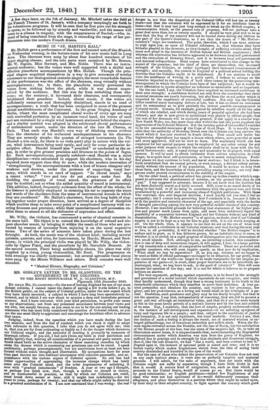MUSIC IN "ST. MARTIN'S HALL"
Mr. Hullah gave a performance of the first and second acts of the Messiah, on Wednesday evening, in the lecture-room of his new music-hall in Long Acre. The choruses were sung by about four hundred members of his upper singing-classes; and the solo parts were sustained by Mr. Benson, me W. Seguin, Miss Stewart, and Mrs. Noble. There was no instru- mental orchestra; but the voices were well supported with a skilful and effective pianoforte accompaniment by Mrs. Hullah. Though the prin- cipal singers acquitted themselves in a way to give assurance of worthy successors to our distinguished oratorio-singers, the most remarkable feature of the performance was the effect of the choruses, sung virtually without accompaniment ; for, in them, the pianoforte merely prevented the voices from sinking below the pitch, while it was almost unper- ceived by the audience. But this was far from enfeebling those cho- ruses; on the contrary, it increased their clearness, and consequently heightened their grandeur. Indeed, choral music, if the voices are suffieiently numerous and thoroughly disciplined, stands in no need of accompaniment; a truth that has been recognized in some of the greatest choral establishments of the Continent. In the great Singing Academy of Berlin, where the most complicated choral works of every age are sung with unrivalled perfection by an immense vocal band, the voices of each part are sustained by a single wind instrument stationed behind the singers; and a similar method was adopted in the celebrated choral performances of ecclesiastical music, under the direction of the late M. Choron, at Paris. That such was Handel's own way of thinking seems evident from the character of his orchestral accompaniments to his choruses. They are severely simple: the quartet of stringed instruments (in The Messiah a trio only, for there is no viola part) play in unison with the voi- ces, wind instruments being used rarely, and only for some particular de- scriptive effect. Handel himself also "presided" or conducted at the or- gan, in order to give greater precision and firmness to the points of fugue, arl. Such accompaniments, properly subdued—and Handel was a strict disciplinarian—were calculated to support his choristers, who in his day required more support than they do now; while the modern innovation of " strengthening " the accompaniments with a host of brazen clangour only weakens and drowns, under the pretence of supporting, vocal har- mony, which stands in no need of support. "In choral music," says a recent writer,* "two and two do not always make four. By doubling the quantity of vocal sound, the greatness of its effect may be doubled; not so when the added quantity of sound is instrumental. This addition, indeed, frequently subtracts from the effect of the whole; for the listener is painfully employed in straining his ear to separate the tones and words of the choristers from the mass of instrumental sounds in which they are smothered." Mr. Hallah's choristers, from the long habit of sing- ing together under proper direction, have arrived at a degree of discipline which enables them to take every point of a complicated harmony with un- erring firmness and precision; while their unembarrassed self-possession en- ables them to attend to all the delicacies of expression and effect.


























 Previous page
Previous page